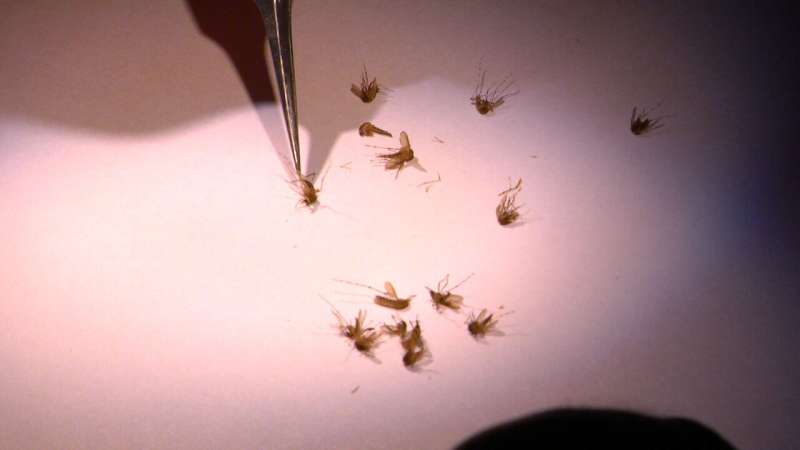How the mosquito immune system fights off the malaria parasite

A new study from Iowa State University entomologists describes how mosquitoes fight off parasites that cause malaria, a disease that sickens millions of people every year.
The study, published recently in the scientific journal Proceedings of the National Academy of Sciences, shows how the mosquito immune system combats malaria parasites at multiple stages of development. A better understanding of the mosquito immune response could lay the groundwork for future research to combat the transmission of malaria, said Ryan Smith, assistant professor of entomology and lead author of the study.
Roughly 219 million cases of malaria, a disease transmitted to humans by the bite of infected mosquitoes, occurred worldwide in 2017, according to the Centers for Disease Control and Prevention. Most cases are concentrated in tropical and subtropical climates such as sub-Saharan Africa and South Asia. The disease resulted in 435,000 deaths in 2017, according to the CDC.
Mosquitoes are required to transmit malaria, acquiring malaria parasites by biting an infected person, then transmitting the disease weeks later after the parasite has completed development in the mosquito. The new study focused on how the mosquito immune system responds to the parasite.
"Mosquitoes are generally pretty good at killing off the parasite," Smith said. "We wanted to figure out the mechanisms and pathways that make that happen."
The researchers treated mosquitoes with a chemical that depleted their immune cells, which are needed to defend the mosquito against pathogens. The experiments showed that malaria parasites survived at greater rates in mosquitoes when the immune cells were depleted. The research also illuminated how these immune cells promoted different "waves" of the mosquito immune response targeting distinct stages of malaria parasites in the mosquito host.
Smith, who also leads the ISU Medical Entomology Laboratory, said the findings increase the understanding of a complement-like pathway that is involved in the initial recognition and killing of parasites, similar to that found in mammals. The work also implicates phenoloxidases, an insect-specific immune response, in causing a secondary immune response directed at later stages of the malaria parasite, he said.
Understanding these immune responses could lead to opportunities to eliminate malaria parasites in the mosquito, thus reducing the transmission of malaria. For instance, Smith said scientists could use genetic approaches to make mosquitoes resistant to malaria parasites. Introducing mosquitoes with enhanced immunity in endemic areas of malaria could significantly reduce human malaria cases.
"There are more steps required to validate that kind of approach, but we think this study lays a foundation for those future experiments," Smith said.
More information: Hyeogsun Kwon et al, Chemical depletion of phagocytic immune cells inAnopheles gambiaereveals dual roles of mosquito hemocytes in anti-Plasmodiumimmunity, Proceedings of the National Academy of Sciences (2019). DOI: 10.1073/pnas.1900147116
















